Analysis of Changing Business Environment and Culture Impact
VerifiedAdded on 2023/01/11
|10
|2663
|90
Report
AI Summary
This report analyzes the impact of culture on the business environment, focusing on online shopping websites and their growth in different countries. It explores the application of Hofstede's cultural dimensions to understand the Australian business landscape, comparing it with India's and recommending strategies for Flipkart's expansion into Thailand. The report also examines Sustainable Development Goals (SDGs) for third-world countries, highlighting challenges and potential solutions. Finally, it discusses how globalization contributes to income inequality, emphasizing the advantages that wealthier nations have in global markets. The report provides a comprehensive overview of the interplay between culture, business strategy, and global economic factors.
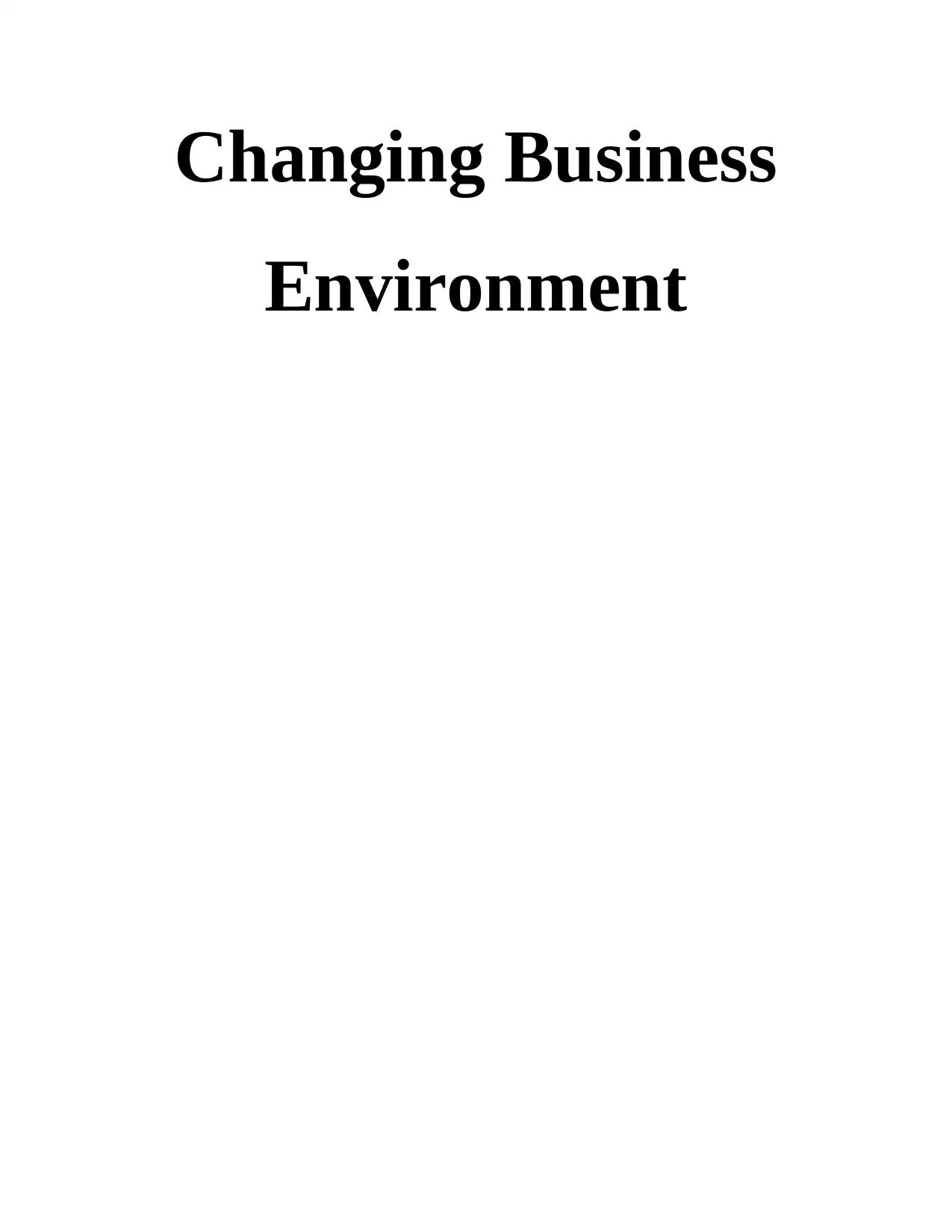
Changing Business
Environment
Environment
Paraphrase This Document
Need a fresh take? Get an instant paraphrase of this document with our AI Paraphraser
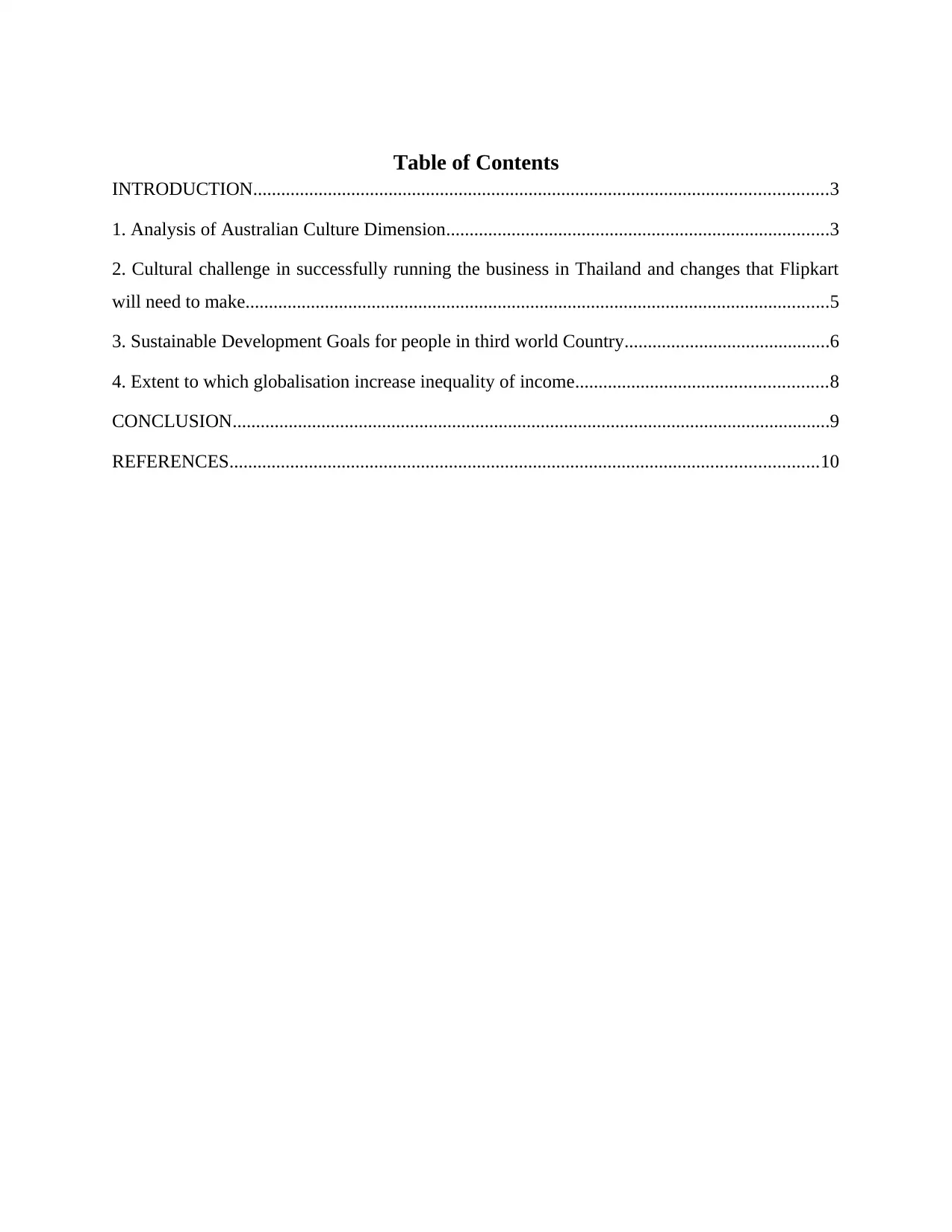
Table of Contents
INTRODUCTION...........................................................................................................................3
1. Analysis of Australian Culture Dimension..................................................................................3
2. Cultural challenge in successfully running the business in Thailand and changes that Flipkart
will need to make.............................................................................................................................5
3. Sustainable Development Goals for people in third world Country............................................6
4. Extent to which globalisation increase inequality of income......................................................8
CONCLUSION................................................................................................................................9
REFERENCES..............................................................................................................................10
INTRODUCTION...........................................................................................................................3
1. Analysis of Australian Culture Dimension..................................................................................3
2. Cultural challenge in successfully running the business in Thailand and changes that Flipkart
will need to make.............................................................................................................................5
3. Sustainable Development Goals for people in third world Country............................................6
4. Extent to which globalisation increase inequality of income......................................................8
CONCLUSION................................................................................................................................9
REFERENCES..............................................................................................................................10
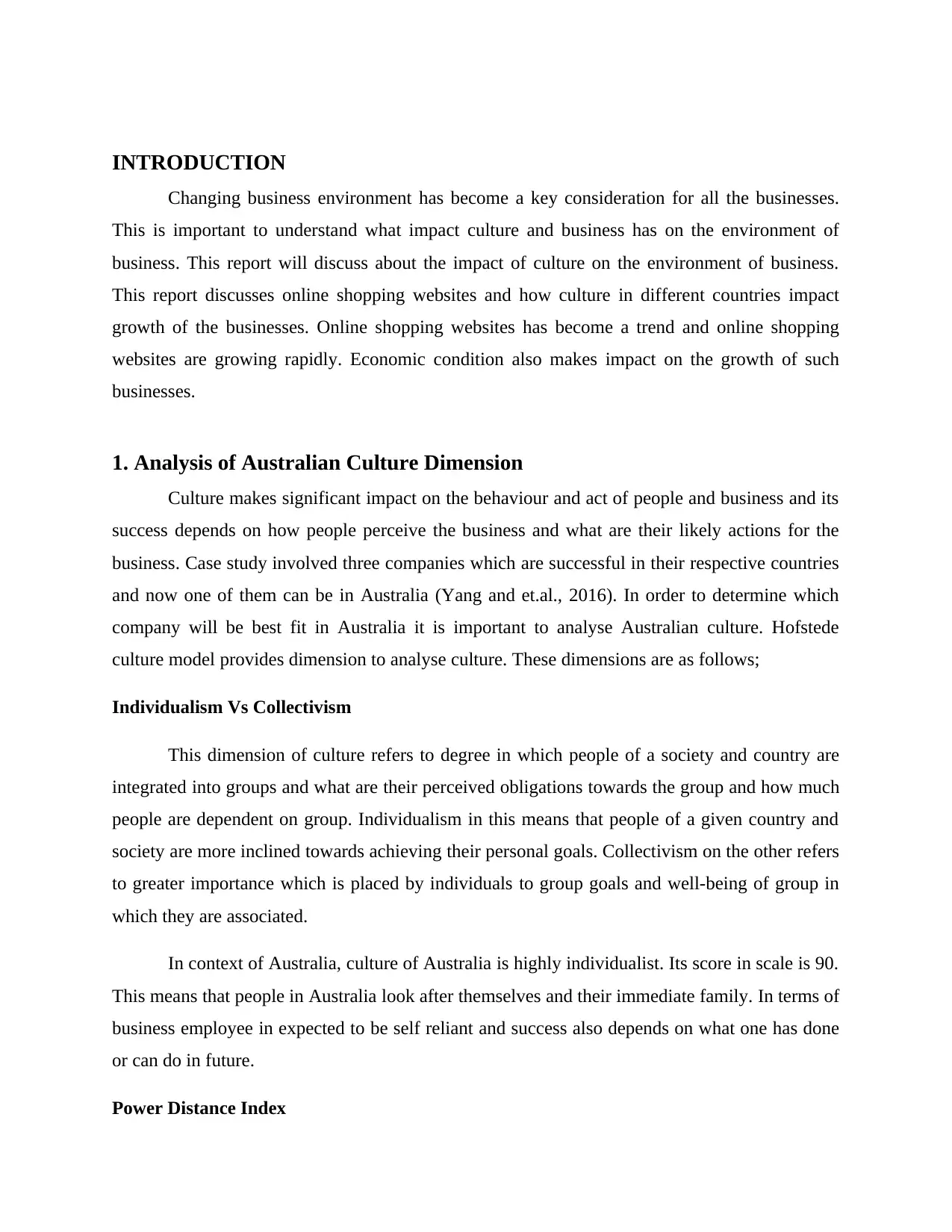
INTRODUCTION
Changing business environment has become a key consideration for all the businesses.
This is important to understand what impact culture and business has on the environment of
business. This report will discuss about the impact of culture on the environment of business.
This report discusses online shopping websites and how culture in different countries impact
growth of the businesses. Online shopping websites has become a trend and online shopping
websites are growing rapidly. Economic condition also makes impact on the growth of such
businesses.
1. Analysis of Australian Culture Dimension
Culture makes significant impact on the behaviour and act of people and business and its
success depends on how people perceive the business and what are their likely actions for the
business. Case study involved three companies which are successful in their respective countries
and now one of them can be in Australia (Yang and et.al., 2016). In order to determine which
company will be best fit in Australia it is important to analyse Australian culture. Hofstede
culture model provides dimension to analyse culture. These dimensions are as follows;
Individualism Vs Collectivism
This dimension of culture refers to degree in which people of a society and country are
integrated into groups and what are their perceived obligations towards the group and how much
people are dependent on group. Individualism in this means that people of a given country and
society are more inclined towards achieving their personal goals. Collectivism on the other refers
to greater importance which is placed by individuals to group goals and well-being of group in
which they are associated.
In context of Australia, culture of Australia is highly individualist. Its score in scale is 90.
This means that people in Australia look after themselves and their immediate family. In terms of
business employee in expected to be self reliant and success also depends on what one has done
or can do in future.
Power Distance Index
Changing business environment has become a key consideration for all the businesses.
This is important to understand what impact culture and business has on the environment of
business. This report will discuss about the impact of culture on the environment of business.
This report discusses online shopping websites and how culture in different countries impact
growth of the businesses. Online shopping websites has become a trend and online shopping
websites are growing rapidly. Economic condition also makes impact on the growth of such
businesses.
1. Analysis of Australian Culture Dimension
Culture makes significant impact on the behaviour and act of people and business and its
success depends on how people perceive the business and what are their likely actions for the
business. Case study involved three companies which are successful in their respective countries
and now one of them can be in Australia (Yang and et.al., 2016). In order to determine which
company will be best fit in Australia it is important to analyse Australian culture. Hofstede
culture model provides dimension to analyse culture. These dimensions are as follows;
Individualism Vs Collectivism
This dimension of culture refers to degree in which people of a society and country are
integrated into groups and what are their perceived obligations towards the group and how much
people are dependent on group. Individualism in this means that people of a given country and
society are more inclined towards achieving their personal goals. Collectivism on the other refers
to greater importance which is placed by individuals to group goals and well-being of group in
which they are associated.
In context of Australia, culture of Australia is highly individualist. Its score in scale is 90.
This means that people in Australia look after themselves and their immediate family. In terms of
business employee in expected to be self reliant and success also depends on what one has done
or can do in future.
Power Distance Index
⊘ This is a preview!⊘
Do you want full access?
Subscribe today to unlock all pages.

Trusted by 1+ million students worldwide
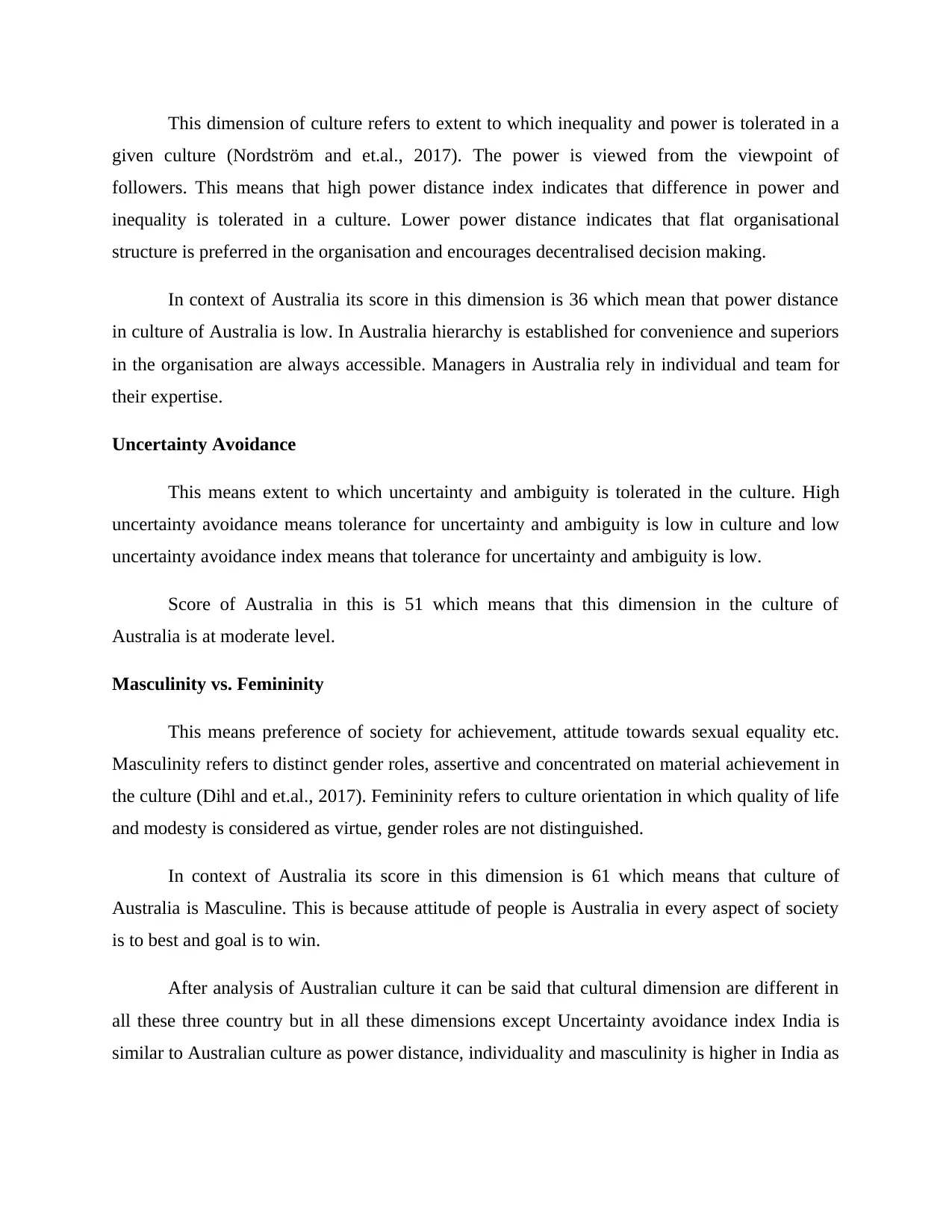
This dimension of culture refers to extent to which inequality and power is tolerated in a
given culture (Nordström and et.al., 2017). The power is viewed from the viewpoint of
followers. This means that high power distance index indicates that difference in power and
inequality is tolerated in a culture. Lower power distance indicates that flat organisational
structure is preferred in the organisation and encourages decentralised decision making.
In context of Australia its score in this dimension is 36 which mean that power distance
in culture of Australia is low. In Australia hierarchy is established for convenience and superiors
in the organisation are always accessible. Managers in Australia rely in individual and team for
their expertise.
Uncertainty Avoidance
This means extent to which uncertainty and ambiguity is tolerated in the culture. High
uncertainty avoidance means tolerance for uncertainty and ambiguity is low in culture and low
uncertainty avoidance index means that tolerance for uncertainty and ambiguity is low.
Score of Australia in this is 51 which means that this dimension in the culture of
Australia is at moderate level.
Masculinity vs. Femininity
This means preference of society for achievement, attitude towards sexual equality etc.
Masculinity refers to distinct gender roles, assertive and concentrated on material achievement in
the culture (Dihl and et.al., 2017). Femininity refers to culture orientation in which quality of life
and modesty is considered as virtue, gender roles are not distinguished.
In context of Australia its score in this dimension is 61 which means that culture of
Australia is Masculine. This is because attitude of people is Australia in every aspect of society
is to best and goal is to win.
After analysis of Australian culture it can be said that cultural dimension are different in
all these three country but in all these dimensions except Uncertainty avoidance index India is
similar to Australian culture as power distance, individuality and masculinity is higher in India as
given culture (Nordström and et.al., 2017). The power is viewed from the viewpoint of
followers. This means that high power distance index indicates that difference in power and
inequality is tolerated in a culture. Lower power distance indicates that flat organisational
structure is preferred in the organisation and encourages decentralised decision making.
In context of Australia its score in this dimension is 36 which mean that power distance
in culture of Australia is low. In Australia hierarchy is established for convenience and superiors
in the organisation are always accessible. Managers in Australia rely in individual and team for
their expertise.
Uncertainty Avoidance
This means extent to which uncertainty and ambiguity is tolerated in the culture. High
uncertainty avoidance means tolerance for uncertainty and ambiguity is low in culture and low
uncertainty avoidance index means that tolerance for uncertainty and ambiguity is low.
Score of Australia in this is 51 which means that this dimension in the culture of
Australia is at moderate level.
Masculinity vs. Femininity
This means preference of society for achievement, attitude towards sexual equality etc.
Masculinity refers to distinct gender roles, assertive and concentrated on material achievement in
the culture (Dihl and et.al., 2017). Femininity refers to culture orientation in which quality of life
and modesty is considered as virtue, gender roles are not distinguished.
In context of Australia its score in this dimension is 61 which means that culture of
Australia is Masculine. This is because attitude of people is Australia in every aspect of society
is to best and goal is to win.
After analysis of Australian culture it can be said that cultural dimension are different in
all these three country but in all these dimensions except Uncertainty avoidance index India is
similar to Australian culture as power distance, individuality and masculinity is higher in India as
Paraphrase This Document
Need a fresh take? Get an instant paraphrase of this document with our AI Paraphraser
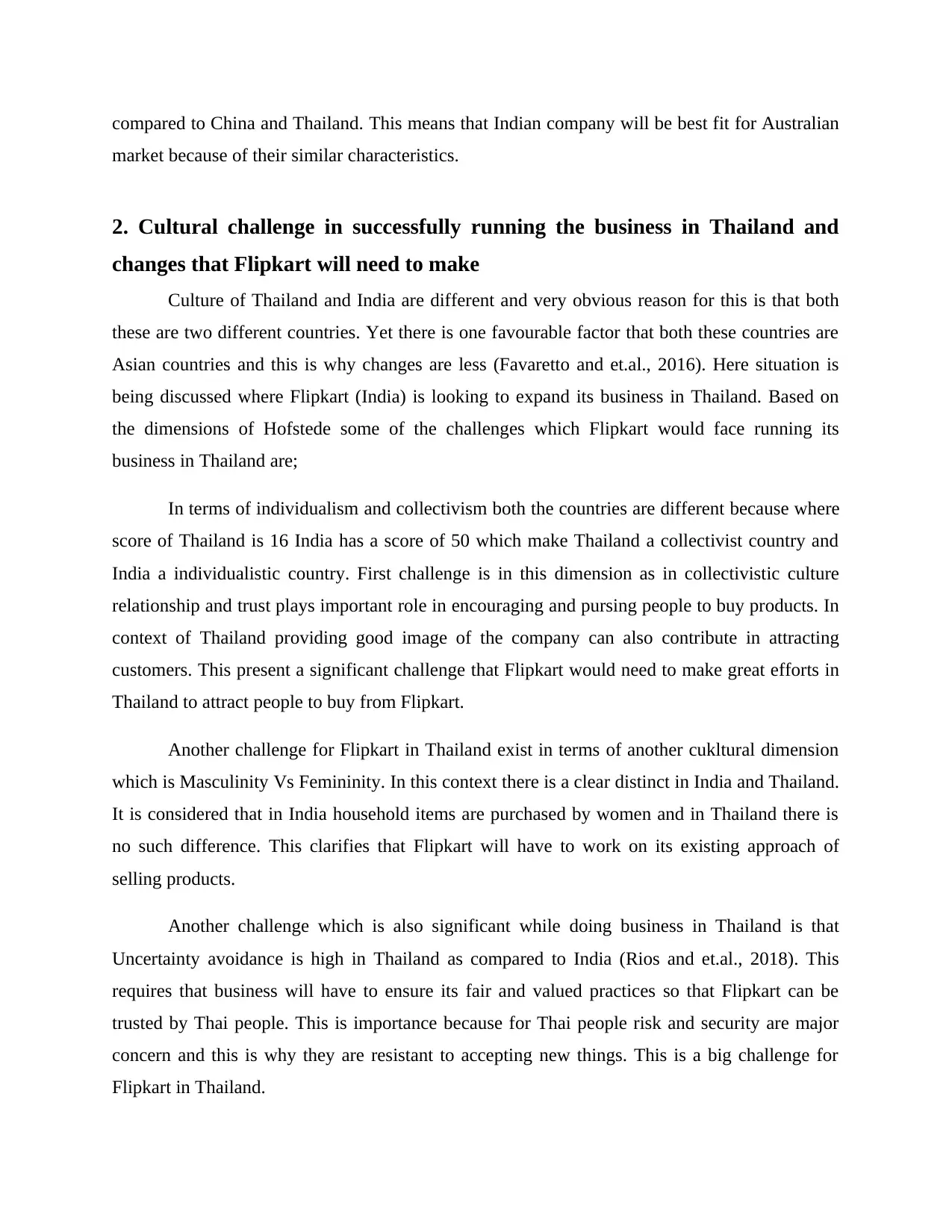
compared to China and Thailand. This means that Indian company will be best fit for Australian
market because of their similar characteristics.
2. Cultural challenge in successfully running the business in Thailand and
changes that Flipkart will need to make
Culture of Thailand and India are different and very obvious reason for this is that both
these are two different countries. Yet there is one favourable factor that both these countries are
Asian countries and this is why changes are less (Favaretto and et.al., 2016). Here situation is
being discussed where Flipkart (India) is looking to expand its business in Thailand. Based on
the dimensions of Hofstede some of the challenges which Flipkart would face running its
business in Thailand are;
In terms of individualism and collectivism both the countries are different because where
score of Thailand is 16 India has a score of 50 which make Thailand a collectivist country and
India a individualistic country. First challenge is in this dimension as in collectivistic culture
relationship and trust plays important role in encouraging and pursing people to buy products. In
context of Thailand providing good image of the company can also contribute in attracting
customers. This present a significant challenge that Flipkart would need to make great efforts in
Thailand to attract people to buy from Flipkart.
Another challenge for Flipkart in Thailand exist in terms of another cukltural dimension
which is Masculinity Vs Femininity. In this context there is a clear distinct in India and Thailand.
It is considered that in India household items are purchased by women and in Thailand there is
no such difference. This clarifies that Flipkart will have to work on its existing approach of
selling products.
Another challenge which is also significant while doing business in Thailand is that
Uncertainty avoidance is high in Thailand as compared to India (Rios and et.al., 2018). This
requires that business will have to ensure its fair and valued practices so that Flipkart can be
trusted by Thai people. This is importance because for Thai people risk and security are major
concern and this is why they are resistant to accepting new things. This is a big challenge for
Flipkart in Thailand.
market because of their similar characteristics.
2. Cultural challenge in successfully running the business in Thailand and
changes that Flipkart will need to make
Culture of Thailand and India are different and very obvious reason for this is that both
these are two different countries. Yet there is one favourable factor that both these countries are
Asian countries and this is why changes are less (Favaretto and et.al., 2016). Here situation is
being discussed where Flipkart (India) is looking to expand its business in Thailand. Based on
the dimensions of Hofstede some of the challenges which Flipkart would face running its
business in Thailand are;
In terms of individualism and collectivism both the countries are different because where
score of Thailand is 16 India has a score of 50 which make Thailand a collectivist country and
India a individualistic country. First challenge is in this dimension as in collectivistic culture
relationship and trust plays important role in encouraging and pursing people to buy products. In
context of Thailand providing good image of the company can also contribute in attracting
customers. This present a significant challenge that Flipkart would need to make great efforts in
Thailand to attract people to buy from Flipkart.
Another challenge for Flipkart in Thailand exist in terms of another cukltural dimension
which is Masculinity Vs Femininity. In this context there is a clear distinct in India and Thailand.
It is considered that in India household items are purchased by women and in Thailand there is
no such difference. This clarifies that Flipkart will have to work on its existing approach of
selling products.
Another challenge which is also significant while doing business in Thailand is that
Uncertainty avoidance is high in Thailand as compared to India (Rios and et.al., 2018). This
requires that business will have to ensure its fair and valued practices so that Flipkart can be
trusted by Thai people. This is importance because for Thai people risk and security are major
concern and this is why they are resistant to accepting new things. This is a big challenge for
Flipkart in Thailand.
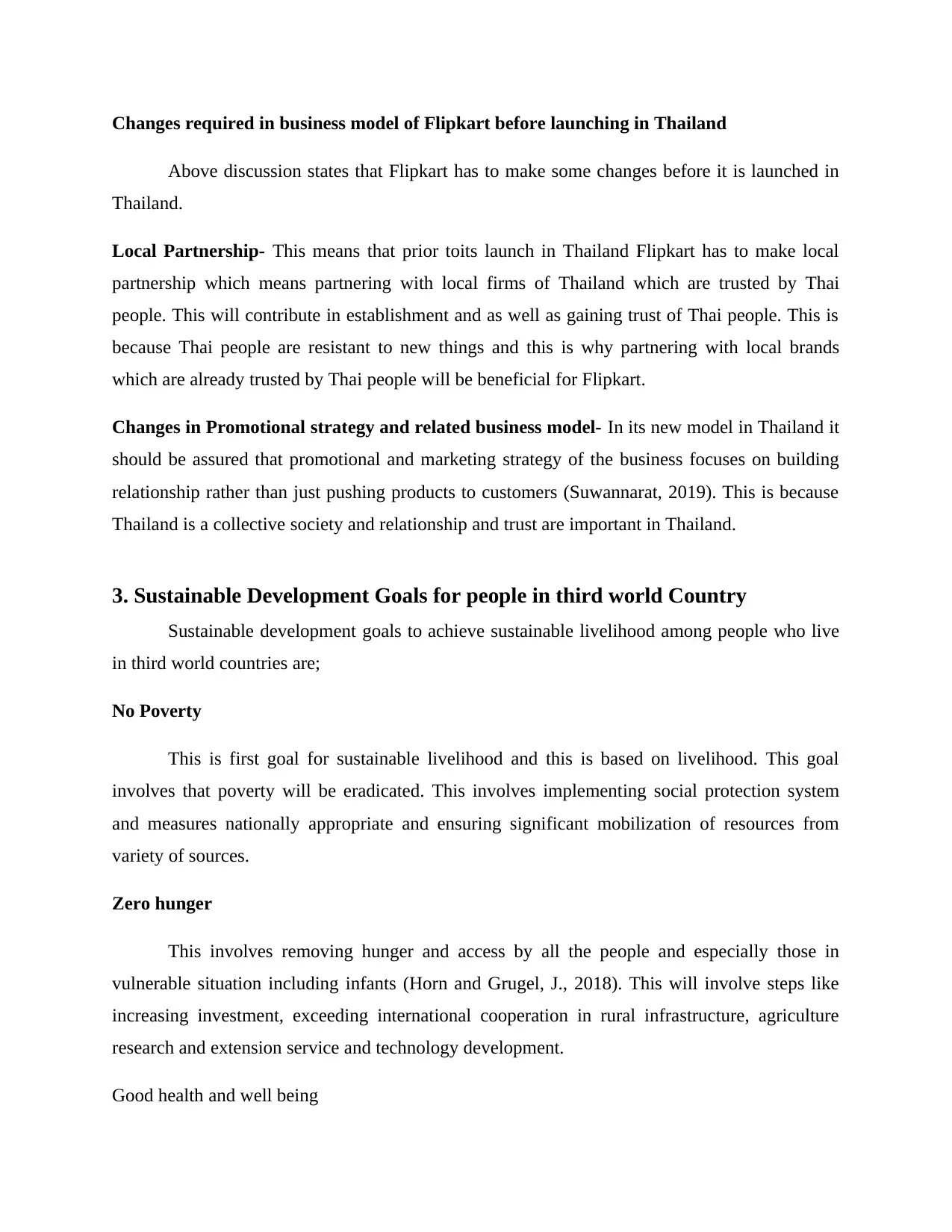
Changes required in business model of Flipkart before launching in Thailand
Above discussion states that Flipkart has to make some changes before it is launched in
Thailand.
Local Partnership- This means that prior toits launch in Thailand Flipkart has to make local
partnership which means partnering with local firms of Thailand which are trusted by Thai
people. This will contribute in establishment and as well as gaining trust of Thai people. This is
because Thai people are resistant to new things and this is why partnering with local brands
which are already trusted by Thai people will be beneficial for Flipkart.
Changes in Promotional strategy and related business model- In its new model in Thailand it
should be assured that promotional and marketing strategy of the business focuses on building
relationship rather than just pushing products to customers (Suwannarat, 2019). This is because
Thailand is a collective society and relationship and trust are important in Thailand.
3. Sustainable Development Goals for people in third world Country
Sustainable development goals to achieve sustainable livelihood among people who live
in third world countries are;
No Poverty
This is first goal for sustainable livelihood and this is based on livelihood. This goal
involves that poverty will be eradicated. This involves implementing social protection system
and measures nationally appropriate and ensuring significant mobilization of resources from
variety of sources.
Zero hunger
This involves removing hunger and access by all the people and especially those in
vulnerable situation including infants (Horn and Grugel, J., 2018). This will involve steps like
increasing investment, exceeding international cooperation in rural infrastructure, agriculture
research and extension service and technology development.
Good health and well being
Above discussion states that Flipkart has to make some changes before it is launched in
Thailand.
Local Partnership- This means that prior toits launch in Thailand Flipkart has to make local
partnership which means partnering with local firms of Thailand which are trusted by Thai
people. This will contribute in establishment and as well as gaining trust of Thai people. This is
because Thai people are resistant to new things and this is why partnering with local brands
which are already trusted by Thai people will be beneficial for Flipkart.
Changes in Promotional strategy and related business model- In its new model in Thailand it
should be assured that promotional and marketing strategy of the business focuses on building
relationship rather than just pushing products to customers (Suwannarat, 2019). This is because
Thailand is a collective society and relationship and trust are important in Thailand.
3. Sustainable Development Goals for people in third world Country
Sustainable development goals to achieve sustainable livelihood among people who live
in third world countries are;
No Poverty
This is first goal for sustainable livelihood and this is based on livelihood. This goal
involves that poverty will be eradicated. This involves implementing social protection system
and measures nationally appropriate and ensuring significant mobilization of resources from
variety of sources.
Zero hunger
This involves removing hunger and access by all the people and especially those in
vulnerable situation including infants (Horn and Grugel, J., 2018). This will involve steps like
increasing investment, exceeding international cooperation in rural infrastructure, agriculture
research and extension service and technology development.
Good health and well being
⊘ This is a preview!⊘
Do you want full access?
Subscribe today to unlock all pages.

Trusted by 1+ million students worldwide
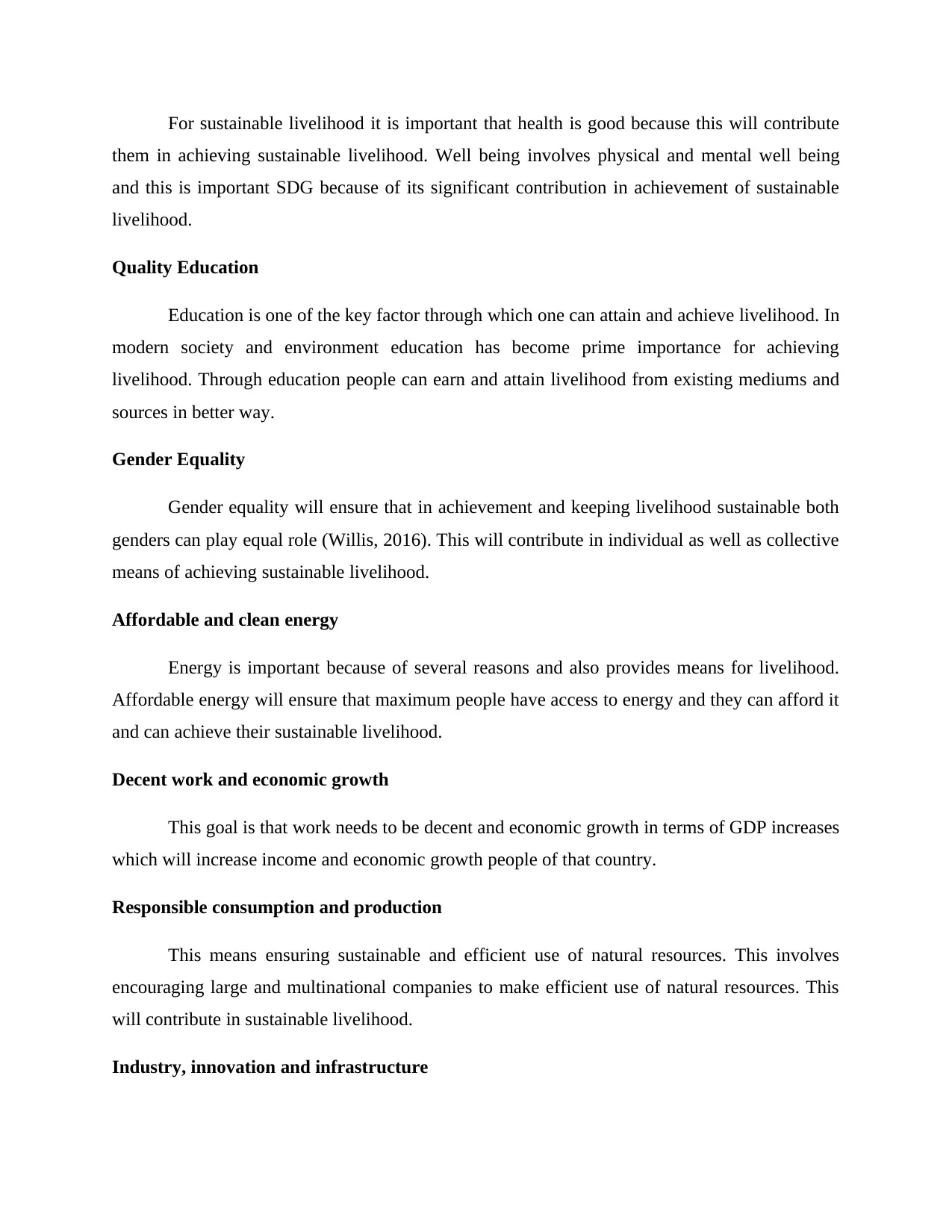
For sustainable livelihood it is important that health is good because this will contribute
them in achieving sustainable livelihood. Well being involves physical and mental well being
and this is important SDG because of its significant contribution in achievement of sustainable
livelihood.
Quality Education
Education is one of the key factor through which one can attain and achieve livelihood. In
modern society and environment education has become prime importance for achieving
livelihood. Through education people can earn and attain livelihood from existing mediums and
sources in better way.
Gender Equality
Gender equality will ensure that in achievement and keeping livelihood sustainable both
genders can play equal role (Willis, 2016). This will contribute in individual as well as collective
means of achieving sustainable livelihood.
Affordable and clean energy
Energy is important because of several reasons and also provides means for livelihood.
Affordable energy will ensure that maximum people have access to energy and they can afford it
and can achieve their sustainable livelihood.
Decent work and economic growth
This goal is that work needs to be decent and economic growth in terms of GDP increases
which will increase income and economic growth people of that country.
Responsible consumption and production
This means ensuring sustainable and efficient use of natural resources. This involves
encouraging large and multinational companies to make efficient use of natural resources. This
will contribute in sustainable livelihood.
Industry, innovation and infrastructure
them in achieving sustainable livelihood. Well being involves physical and mental well being
and this is important SDG because of its significant contribution in achievement of sustainable
livelihood.
Quality Education
Education is one of the key factor through which one can attain and achieve livelihood. In
modern society and environment education has become prime importance for achieving
livelihood. Through education people can earn and attain livelihood from existing mediums and
sources in better way.
Gender Equality
Gender equality will ensure that in achievement and keeping livelihood sustainable both
genders can play equal role (Willis, 2016). This will contribute in individual as well as collective
means of achieving sustainable livelihood.
Affordable and clean energy
Energy is important because of several reasons and also provides means for livelihood.
Affordable energy will ensure that maximum people have access to energy and they can afford it
and can achieve their sustainable livelihood.
Decent work and economic growth
This goal is that work needs to be decent and economic growth in terms of GDP increases
which will increase income and economic growth people of that country.
Responsible consumption and production
This means ensuring sustainable and efficient use of natural resources. This involves
encouraging large and multinational companies to make efficient use of natural resources. This
will contribute in sustainable livelihood.
Industry, innovation and infrastructure
Paraphrase This Document
Need a fresh take? Get an instant paraphrase of this document with our AI Paraphraser
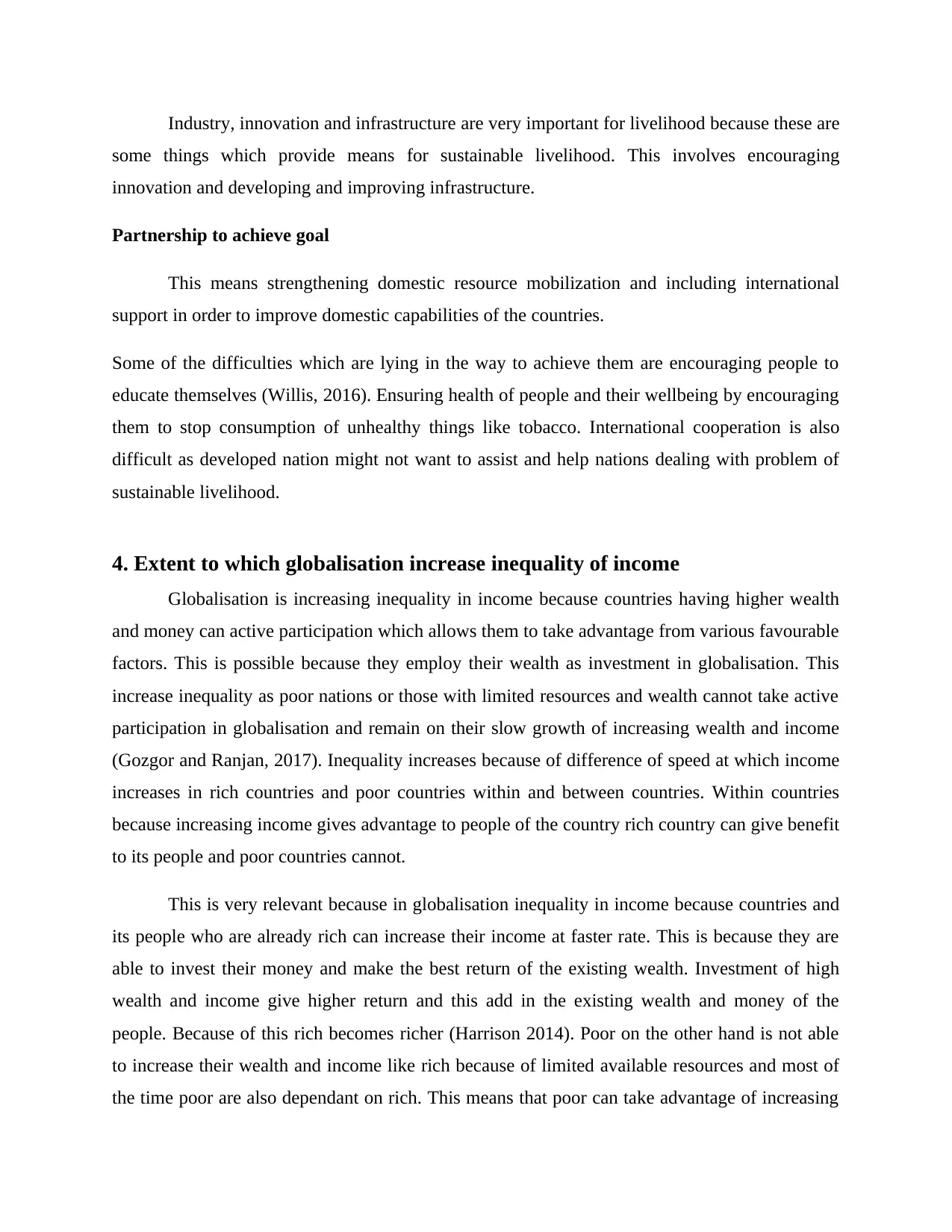
Industry, innovation and infrastructure are very important for livelihood because these are
some things which provide means for sustainable livelihood. This involves encouraging
innovation and developing and improving infrastructure.
Partnership to achieve goal
This means strengthening domestic resource mobilization and including international
support in order to improve domestic capabilities of the countries.
Some of the difficulties which are lying in the way to achieve them are encouraging people to
educate themselves (Willis, 2016). Ensuring health of people and their wellbeing by encouraging
them to stop consumption of unhealthy things like tobacco. International cooperation is also
difficult as developed nation might not want to assist and help nations dealing with problem of
sustainable livelihood.
4. Extent to which globalisation increase inequality of income
Globalisation is increasing inequality in income because countries having higher wealth
and money can active participation which allows them to take advantage from various favourable
factors. This is possible because they employ their wealth as investment in globalisation. This
increase inequality as poor nations or those with limited resources and wealth cannot take active
participation in globalisation and remain on their slow growth of increasing wealth and income
(Gozgor and Ranjan, 2017). Inequality increases because of difference of speed at which income
increases in rich countries and poor countries within and between countries. Within countries
because increasing income gives advantage to people of the country rich country can give benefit
to its people and poor countries cannot.
This is very relevant because in globalisation inequality in income because countries and
its people who are already rich can increase their income at faster rate. This is because they are
able to invest their money and make the best return of the existing wealth. Investment of high
wealth and income give higher return and this add in the existing wealth and money of the
people. Because of this rich becomes richer (Harrison 2014). Poor on the other hand is not able
to increase their wealth and income like rich because of limited available resources and most of
the time poor are also dependant on rich. This means that poor can take advantage of increasing
some things which provide means for sustainable livelihood. This involves encouraging
innovation and developing and improving infrastructure.
Partnership to achieve goal
This means strengthening domestic resource mobilization and including international
support in order to improve domestic capabilities of the countries.
Some of the difficulties which are lying in the way to achieve them are encouraging people to
educate themselves (Willis, 2016). Ensuring health of people and their wellbeing by encouraging
them to stop consumption of unhealthy things like tobacco. International cooperation is also
difficult as developed nation might not want to assist and help nations dealing with problem of
sustainable livelihood.
4. Extent to which globalisation increase inequality of income
Globalisation is increasing inequality in income because countries having higher wealth
and money can active participation which allows them to take advantage from various favourable
factors. This is possible because they employ their wealth as investment in globalisation. This
increase inequality as poor nations or those with limited resources and wealth cannot take active
participation in globalisation and remain on their slow growth of increasing wealth and income
(Gozgor and Ranjan, 2017). Inequality increases because of difference of speed at which income
increases in rich countries and poor countries within and between countries. Within countries
because increasing income gives advantage to people of the country rich country can give benefit
to its people and poor countries cannot.
This is very relevant because in globalisation inequality in income because countries and
its people who are already rich can increase their income at faster rate. This is because they are
able to invest their money and make the best return of the existing wealth. Investment of high
wealth and income give higher return and this add in the existing wealth and money of the
people. Because of this rich becomes richer (Harrison 2014). Poor on the other hand is not able
to increase their wealth and income like rich because of limited available resources and most of
the time poor are also dependant on rich. This means that poor can take advantage of increasing
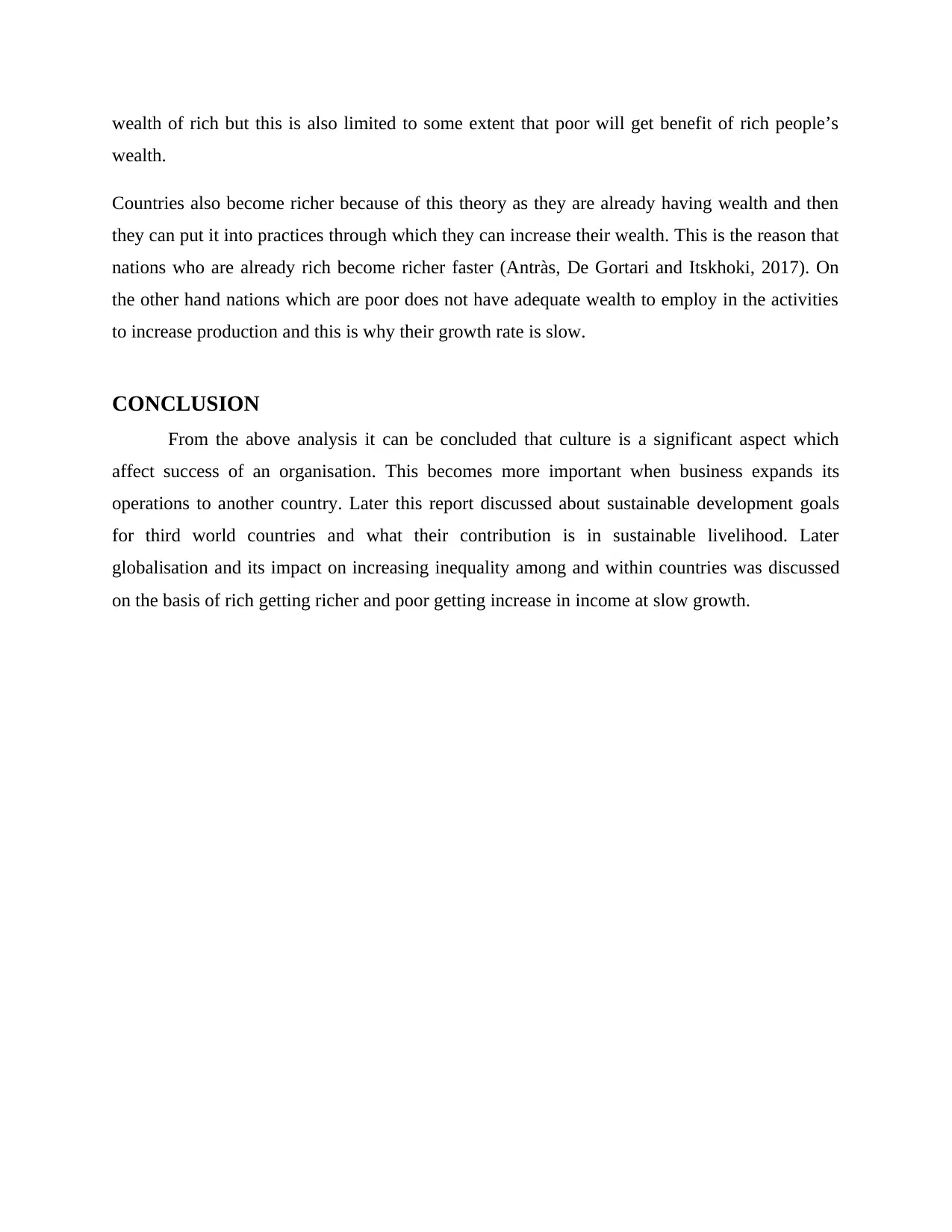
wealth of rich but this is also limited to some extent that poor will get benefit of rich people’s
wealth.
Countries also become richer because of this theory as they are already having wealth and then
they can put it into practices through which they can increase their wealth. This is the reason that
nations who are already rich become richer faster (Antràs, De Gortari and Itskhoki, 2017). On
the other hand nations which are poor does not have adequate wealth to employ in the activities
to increase production and this is why their growth rate is slow.
CONCLUSION
From the above analysis it can be concluded that culture is a significant aspect which
affect success of an organisation. This becomes more important when business expands its
operations to another country. Later this report discussed about sustainable development goals
for third world countries and what their contribution is in sustainable livelihood. Later
globalisation and its impact on increasing inequality among and within countries was discussed
on the basis of rich getting richer and poor getting increase in income at slow growth.
wealth.
Countries also become richer because of this theory as they are already having wealth and then
they can put it into practices through which they can increase their wealth. This is the reason that
nations who are already rich become richer faster (Antràs, De Gortari and Itskhoki, 2017). On
the other hand nations which are poor does not have adequate wealth to employ in the activities
to increase production and this is why their growth rate is slow.
CONCLUSION
From the above analysis it can be concluded that culture is a significant aspect which
affect success of an organisation. This becomes more important when business expands its
operations to another country. Later this report discussed about sustainable development goals
for third world countries and what their contribution is in sustainable livelihood. Later
globalisation and its impact on increasing inequality among and within countries was discussed
on the basis of rich getting richer and poor getting increase in income at slow growth.
⊘ This is a preview!⊘
Do you want full access?
Subscribe today to unlock all pages.

Trusted by 1+ million students worldwide
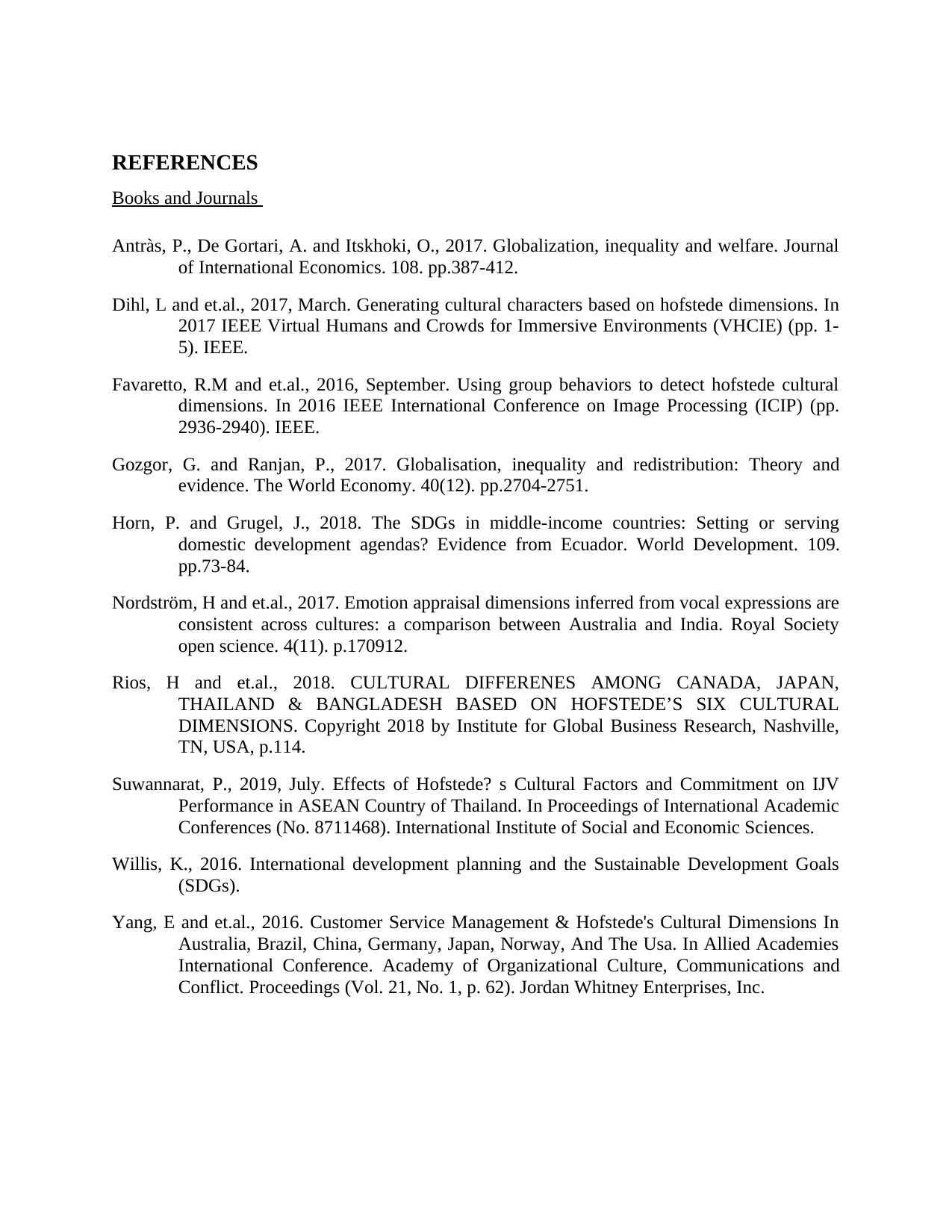
REFERENCES
Books and Journals
Antràs, P., De Gortari, A. and Itskhoki, O., 2017. Globalization, inequality and welfare. Journal
of International Economics. 108. pp.387-412.
Dihl, L and et.al., 2017, March. Generating cultural characters based on hofstede dimensions. In
2017 IEEE Virtual Humans and Crowds for Immersive Environments (VHCIE) (pp. 1-
5). IEEE.
Favaretto, R.M and et.al., 2016, September. Using group behaviors to detect hofstede cultural
dimensions. In 2016 IEEE International Conference on Image Processing (ICIP) (pp.
2936-2940). IEEE.
Gozgor, G. and Ranjan, P., 2017. Globalisation, inequality and redistribution: Theory and
evidence. The World Economy. 40(12). pp.2704-2751.
Horn, P. and Grugel, J., 2018. The SDGs in middle-income countries: Setting or serving
domestic development agendas? Evidence from Ecuador. World Development. 109.
pp.73-84.
Nordström, H and et.al., 2017. Emotion appraisal dimensions inferred from vocal expressions are
consistent across cultures: a comparison between Australia and India. Royal Society
open science. 4(11). p.170912.
Rios, H and et.al., 2018. CULTURAL DIFFERENES AMONG CANADA, JAPAN,
THAILAND & BANGLADESH BASED ON HOFSTEDE’S SIX CULTURAL
DIMENSIONS. Copyright 2018 by Institute for Global Business Research, Nashville,
TN, USA, p.114.
Suwannarat, P., 2019, July. Effects of Hofstede? s Cultural Factors and Commitment on IJV
Performance in ASEAN Country of Thailand. In Proceedings of International Academic
Conferences (No. 8711468). International Institute of Social and Economic Sciences.
Willis, K., 2016. International development planning and the Sustainable Development Goals
(SDGs).
Yang, E and et.al., 2016. Customer Service Management & Hofstede's Cultural Dimensions In
Australia, Brazil, China, Germany, Japan, Norway, And The Usa. In Allied Academies
International Conference. Academy of Organizational Culture, Communications and
Conflict. Proceedings (Vol. 21, No. 1, p. 62). Jordan Whitney Enterprises, Inc.
Books and Journals
Antràs, P., De Gortari, A. and Itskhoki, O., 2017. Globalization, inequality and welfare. Journal
of International Economics. 108. pp.387-412.
Dihl, L and et.al., 2017, March. Generating cultural characters based on hofstede dimensions. In
2017 IEEE Virtual Humans and Crowds for Immersive Environments (VHCIE) (pp. 1-
5). IEEE.
Favaretto, R.M and et.al., 2016, September. Using group behaviors to detect hofstede cultural
dimensions. In 2016 IEEE International Conference on Image Processing (ICIP) (pp.
2936-2940). IEEE.
Gozgor, G. and Ranjan, P., 2017. Globalisation, inequality and redistribution: Theory and
evidence. The World Economy. 40(12). pp.2704-2751.
Horn, P. and Grugel, J., 2018. The SDGs in middle-income countries: Setting or serving
domestic development agendas? Evidence from Ecuador. World Development. 109.
pp.73-84.
Nordström, H and et.al., 2017. Emotion appraisal dimensions inferred from vocal expressions are
consistent across cultures: a comparison between Australia and India. Royal Society
open science. 4(11). p.170912.
Rios, H and et.al., 2018. CULTURAL DIFFERENES AMONG CANADA, JAPAN,
THAILAND & BANGLADESH BASED ON HOFSTEDE’S SIX CULTURAL
DIMENSIONS. Copyright 2018 by Institute for Global Business Research, Nashville,
TN, USA, p.114.
Suwannarat, P., 2019, July. Effects of Hofstede? s Cultural Factors and Commitment on IJV
Performance in ASEAN Country of Thailand. In Proceedings of International Academic
Conferences (No. 8711468). International Institute of Social and Economic Sciences.
Willis, K., 2016. International development planning and the Sustainable Development Goals
(SDGs).
Yang, E and et.al., 2016. Customer Service Management & Hofstede's Cultural Dimensions In
Australia, Brazil, China, Germany, Japan, Norway, And The Usa. In Allied Academies
International Conference. Academy of Organizational Culture, Communications and
Conflict. Proceedings (Vol. 21, No. 1, p. 62). Jordan Whitney Enterprises, Inc.
1 out of 10
Related Documents
Your All-in-One AI-Powered Toolkit for Academic Success.
+13062052269
info@desklib.com
Available 24*7 on WhatsApp / Email
![[object Object]](/_next/static/media/star-bottom.7253800d.svg)
Unlock your academic potential
Copyright © 2020–2026 A2Z Services. All Rights Reserved. Developed and managed by ZUCOL.





